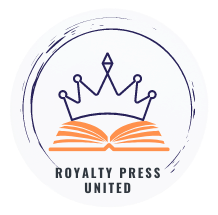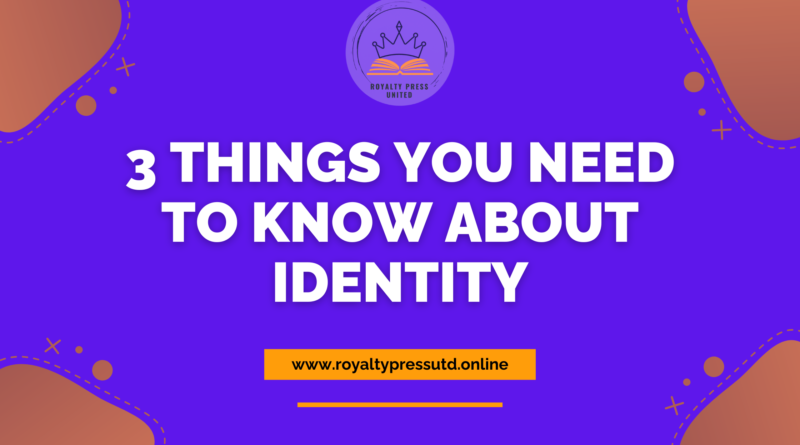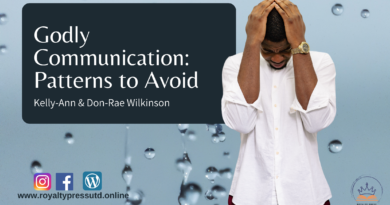3 Things You Need To Know About Identity
In our modern world the phrase “I identify as…” is one that is constantly being used, the concept of identity in our modern world is a subjective one that is mostly hinged on one’s sexual preferences, where one was born or even one’s passions or hobbies. The aim of this post isn’t to discuss matters of sexuality rather we are more interested in digging into the Christian concept of identity and how identity plays into engagement in other areas of our lives. Here are three things we need to know about identity as we embark on this journey of spiritual formation, self development and love of others.
1. Your Identity matters
“Today we will hear many presumably learned people say that there is no such thing as human nature, or that human beings do not have a nature… It then becomes part of the unchecked political moral rage against identity that characterizes modern life. This is a rage predicated upon the idea that identity restricts freedom. If I am a human being as opposed to say a brussels sprout or a squirrel, that places a restriction upon what I can do, what I ought to do or what should be done to me.”
Dallas Willard – Renovation of the heart
One of the great struggles of our time is our wrestle with identity; the question of what it is and whether it even matters at all. But in order to truly deny the importance of identity one must deny the reality of human nature and that isn’t so easily done. Willard proposes that the political rage against it, is based on the view that identity restricts freedom, that is if one’s nature is as such, one cannot do anything outside of what the characteristics of such is supposed to be. As Christians we believe that our identity is rediscovered in Christ, because through faith in him we are able to return to our father and creator, who in his creation of us clearly define who we are, who we were meant to be. So who we identify as matters and we learn that our identity becomes even clearer in Christ, outside of him we can be whatever we want to be, leading us to further confusion and separation from God, but in him we find the identity that doesn’t restrict us as we may have initially believed, but frees us.
If we go back to Ephesians chapter 2, we see that the writer talks about the state of man after the fall, we were spiritually dead unable to connect to God who is spirit, we were followers of the course of this world & the prince of the air, walking among those who disobey in faith and practice in other words we identified with the “sons of disobedience”, we were living in the passions of our flesh and carrying out the desires of mind and body. Our natural identity were children of wrath and so we acted like children of wrath, living far from God, his standards and his presence.
Our identity matters because who we are dictates how we live. It is not something we can discard or pretend has no bearings on our lives. Whether we want to accept it or not, we will always identify as something, whether we choose it or it is thrust upon us. As believers we are given the free gift of salvation that allows us to choose to no longer live as children of wrath or see ourselves as such, but to live as children of God. Those who accept this free gift of salvation and are restored to the father, are now identified as son’s of God (John 1:12), as new (2 Cor 5:17), as chosen, royal and holy (1 Pet 2:9), as friends of God (John 15:15), as citizens of heaven (Phil 3:20).
2. Even in our brokenness we are God’s image bearers
“It would be good for us to reflect on our likeness to God more often. It will probably amaze us to realize that when the creator of the universe wanted to create something “in his image” something more like himself than all the rest of creation, he made us.”
Wayne Grudem – Systematic Theology
We were made in God’s image and likeness (Gen 1:27), not to be confused with the idea that we were made gods. An image refers to something that is similar but not identical to the thing it represents, we are similar to God in many ways, but we are not gods, we were made to reflect and represent him on the earth. God made mankind, both male and female in his image and he gave them dominion over the earth. We are not quite like the other creatures, formed with words, we were formed with hands and breathed into. As image bearers we have attributes that sets us apart from the rest of creation. We are morally accountable for our actions and have an inner sense of right and wrong. We have immaterial spirits and are able to relate to God and we will not cease to exist but will live forever. We are able to reason, to think logically and to learn, able to use complex language. We also have an awareness of the distant future, we are also creative in areas of art, music, literature, science and technology. We are emotionally complex. We are able to relate to each other in community, in marriage and in family, we are able to live in harmony with each other. Through our physical bodies we are able to fulfill God’s will, along with the God-given ability to bear and raise children who are like ourselves.
In our brokenness our image bearing ability is not perfect, rather we struggle to reflect God in our brokenness, our relationships are marked by selfishness and conflict, our thoughts easily manipulated, our words corrupted, our physical bodies fail us from time to time, now subjected to sickness, our creativity is used to serve our depravity, our sense of right and wrong is skewed. Yet, this does not take away from the reality that we were made in God’s image and likeness, all of us, even those who may still be dead to his presence. Even those of us who are believers, whose hearts has been changed and it being well kept, wrestle with fragmented parts within us. But God. We are still valuable in his sight, and I pray that we see that value in each other, regardless of where we stand.
3. Knowing God is the beginning of Knowing Yourself
...if God is bigger than we can imagine, we are wasting our time to chase after something or someone lesser than Him. And because we know that He is our all in all, in our temptations, our trials, and our victories, we must place our ultimate identity not in who we are, but in who we know God to be.”
Jackie Hill Perry – Gay Girl, Good God
So you may be asking where do I start with this whole knowing who I am thing? You start with knowing God. The bible tells us that the fear of God is the beginning of wisdom and the knowledge of the holy one is understanding (Prov 9:10). If we were created by a holy God who made us in his image, it follows that to get a better idea of who we are supposed to be, how we are supposed to live we must know God. In Ephesians 2 we are told that God, who is rich in mercy, because of his great love, made us alive in Christ. In one account in the bible the apostle Paul came upon a place where there was a altar to the “unknown God”, to which Paul responded: “What therefore you worship as unknown, this I proclaim to you. The God who made the world and everything in it, being Lord of heaven and earth, does not live in temples made by man” (Acts 17:23-24). Jesus asked the disciples “who do you say that I am?” to which Peter responded “you are the Christ, son of the living God”, these moments of revelation of who God is are pivotal to every believer’s walk. It’s that moment when we look upon his goodness, his purity, his righteousness and we come to realize how lacking we truly are, how empty are our pursuits and idols.
In Luke 10:25-28 an expert of the law asked Jesus what to do to recover eternal life and Jesus asked him what the law says, the man responded that it says “you shall love the Lord your God with all your heart, and with all your soul and with all your strength and with all your mind and your neighbor as yourself” and Jesus told him you have the answer do that and you shall live.
It sounds simple until you understand human nature in its brokenness. What Jesus was pointing to here is that mankind must submit his human nature to knowing and loving God. How can we do this when identity is one of the major struggles of our time. We do not know or want to accept who we are as human beings because of its restrictions. This is an idea that is sustained by the prince of the air, the spirit at work in the sons of disobedience. Whose aim is to resist everything God has designed. In my view a denial of God’s nature, his love and grace towards us sustains our ignorance of who we are. True ignorance, that is one who has not been made alive in Christ, is unable to begin to comprehend some of these truths. God has to be central to everything we do as believers, or it will all be in vain.
The beautiful thing about knowing who you are in Christ and identifying as a child of God, is that it enables us to have grace for ourselves and for each other. When we understand God’s heart towards us from the start, that we are able to reflect him in the world in which he has placed us. Engagement with that world, the people in it and the tasks before us becomes more impactful and engagement with one’s self becomes more deliberate.
Be a blessing,
Kelly PW
Check out our discussion on this topic on via You tube via Hope 103.1 FM, stay tuned for other posts as we continue to work towards engagement in 2024 and look out for some book recommendations you can add to your reading list on the topic of knowing God and engagement.





